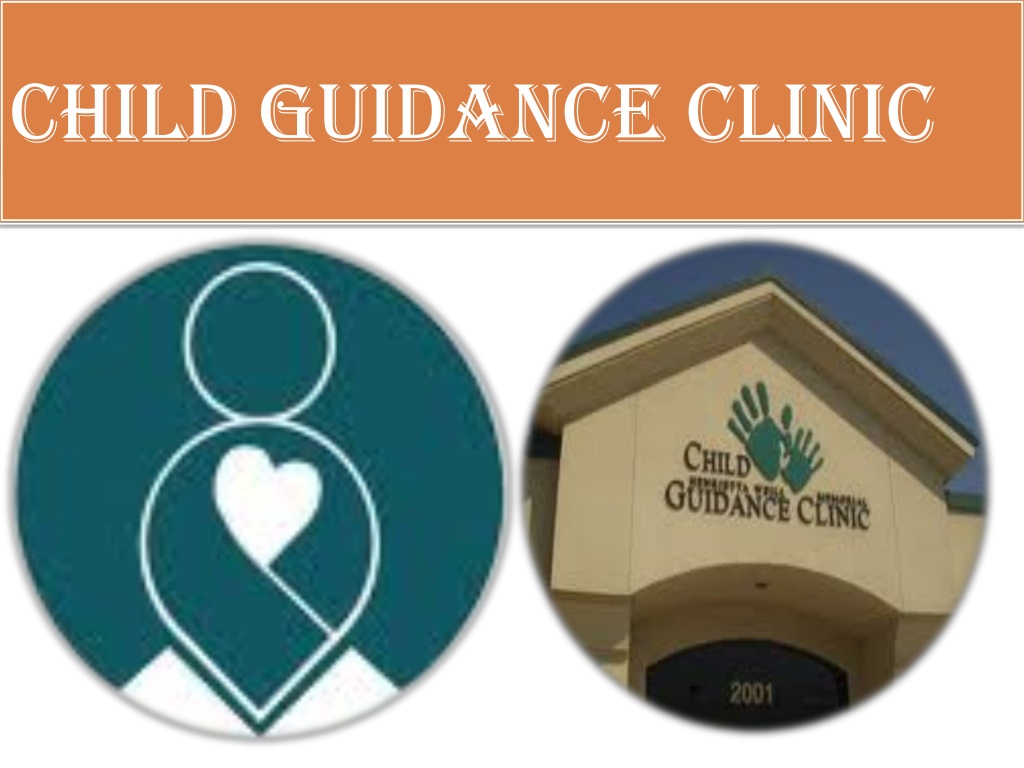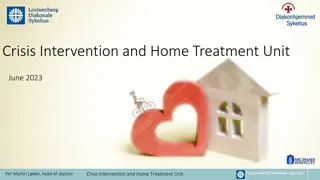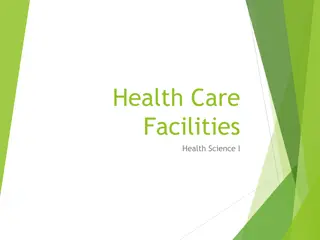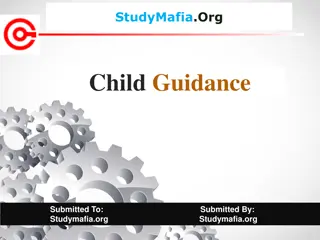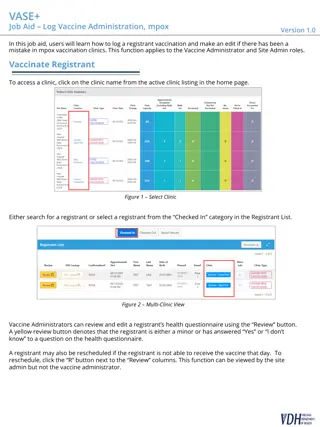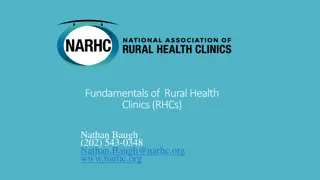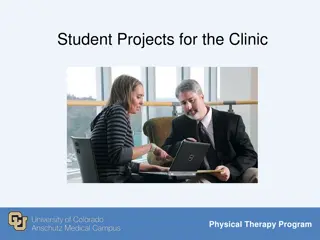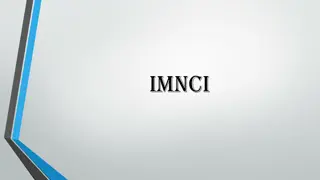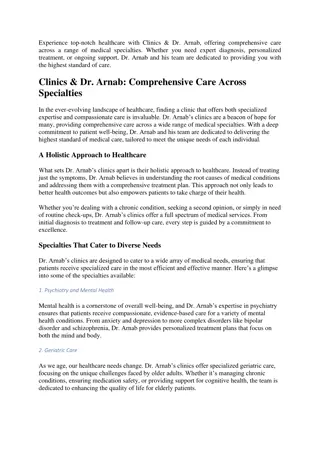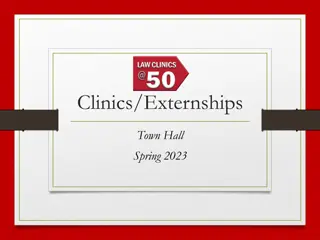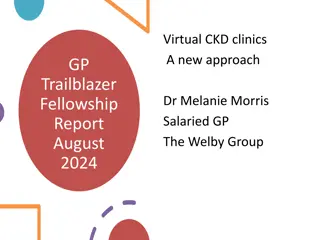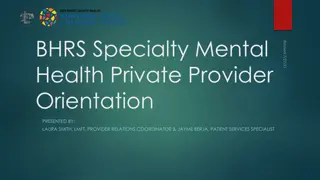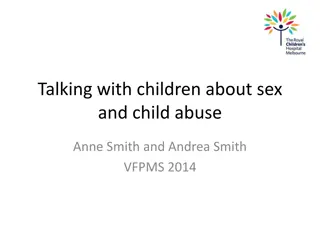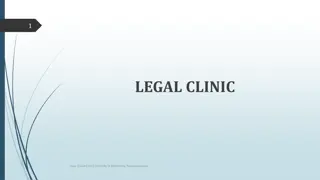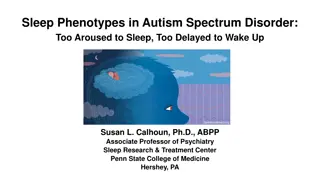Child Guidance Clinics: A Comprehensive Overview
Child guidance clinics provide specialized services for children facing learning difficulties, poor school performance, or emotional problems. Originating in Chicago in 1909, these clinics offer various specialties under one roof, promoting easy access for children and parents seeking help. In India, the first clinic was established in Mumbai in 1936, with subsequent developments in Ranchi. These clinics focus on addressing a range of behavioral and psychological issues in children, aiming to facilitate their adaptation to the environment. Principles of child guidance clinics involve treating the child holistically and fostering harmonious family relations to address maladjustments.
Download Presentation

Please find below an Image/Link to download the presentation.
The content on the website is provided AS IS for your information and personal use only. It may not be sold, licensed, or shared on other websites without obtaining consent from the author.If you encounter any issues during the download, it is possible that the publisher has removed the file from their server.
You are allowed to download the files provided on this website for personal or commercial use, subject to the condition that they are used lawfully. All files are the property of their respective owners.
The content on the website is provided AS IS for your information and personal use only. It may not be sold, licensed, or shared on other websites without obtaining consent from the author.
E N D
Presentation Transcript
INTRODUCTION Child guidance clinic was started in 1909 in Chicago to deal with problem of learning difficulties, Poor School performance or emotional Problems in a setting where various specialties are available under one roof and where children or their parents can walk in comfortably to seek help.
The first child guidance clinic was organized in India in 1936 at Mumbai. A child guidance clinic was started in 1950 at Ranchi city and an independent 50-bed child psychiatry unit started in 1975.
DEFINITION DEFINITION Child guidance clinic are specialized clinics that deal with children of normal and abnormal intelligence, exhibiting a range of behaviours and psychological problems which are summed up as maladjustments
A child guidance clinic is one of the medico social amenities for the organized and scientific study and treatment of maladjustment in children
PRINCIPLES OF CHILD GUIDANCE CLINIC PRINCIPLES OF CHILD GUIDANCE CLINIC Removal of the particular behavior problem for which a child is referred, treatment is directed to the child as a whole. The total personality of the child is studied and treated in order to make him better adapted to his environment.
All this is possible only through repeated interactions and counseling of the child and family by a team of specialist including: Pediatrician, Neuropsychologist Behavioral Therapist, Speech Therapists and Special Tutor Trained This is the basic philosophy of CGC.
To bring harmonious relations between the parents as the lack of these is causing the child s misbehavior. Modification of such faulty parental attitude as far as responsible for the child s maladjustment is another important aim of treatment.
Providing help for the children with behavioral problems like pica,enuresis, somnambulism, breath holding spells, temper tantrum habits thumb sucking, nail biting, head banging, stammering, tics.
Interviewing and interacting with the child and the parents. Give appropriate advice and counseling to both parents and child. Behavioral modification therapy. Providing counseling, guidance and information to parents regarding care and bringing up of their children
MANAGEMENT. MANAGEMENT .
Providing care for children with learning difficulties which includes:- Early identification Physical examination Personal interview Counseling the parents and refer
FACULTY FACULTY
ACTIVITIES ACTIVITIES Initial triage, assessment and evaluation Individual, family and group therapy Psychological evaluation Psychiatric evaluation and medication management Sexual abuse evaluation and treatment
Anger management and psycho-educational groups Parent groups Training and consultation to schools and community organizations
INTAKE INTERVIEW INTAKE INTERVIEW This is a major step in diagnosis, with information from parents, child, and report from teacher and samples from the child s work, to identify the child s problems and to determine which other specialist needs to examine the child, if necessary.
PHYSICAL/ NEUROLOGICAL PHYSICAL/ NEUROLOGICAL EXAMINATION EXAMINATION This is done to rule out soft neurological signs and sensory deficits. Tests like EEG or other investigations may be done for the same.
ASSESSMENT OF POOR SCHOOL PERFORMANCE ASSESSMENT OF POOR SCHOOL PERFORMANCE (LEARNING DISORDERS) (LEARNING DISORDERS) The basic sets of assessments include: Tests of general Intelligence (IQ) and Types of Intelligence| Assessment of Academic Skills- Reading, Writing, Spelling, Math's and Language|
Assessment of Pre academic Skills (for children below 6 years)| Tests of Speech and Language| Identification of Special Abilities/ Aptitude Testing| Neurological assessment/ EEG, etc.
PARENT AID PROGRAM PARENT AID PROGRAM
The Parent Aid Program provides home based education, advocacy and case management services to families. Through a diverse staff of Family Outreach Workers, provides support and encouragement while assisting families in mobilizing their personal resources. There is no fee to the families who participate in the program and services.
SERVICES INCLUDE SERVICES INCLUDE Home based parent education and support Advocacy Coordination of Services Reunification Services Case Management
SUBSTANCE ABUSE PROGRAM SUBSTANCE ABUSE PROGRAM Adolescent Substance Abuse services are offered to youth to assist in making the behavioral, psychological, and lifestyle changes to become drug and alcohol free and avoid relapse.
PROGRAM COMPONENTS PROGRAM COMPONENTS INCLUDE INCLUDE Evaluation Group Treatment Individual and Family Therapy Family Education and Support ECCP,( Early Childhood Consultation Partnership)
Therapy Therapy After initial information is gathered and the nature of the child s presenting challenges is determined, treatment will begin. This usually takes the form of meeting with the child individually as well as having meetings with the entire family. Services are offered on sliding fee scale, based on income and family size. No one is denied services because of inability to pay.
Individual and Family Therapy Individual and Family Therapy
CoNT Child Guidance Center use a family systems model, which views the child not in isolation, but rather as a part of the family system where each member has a role and influence on every other member
Staff works with the child and family by introducing them to a wide range of cognitive behavioral interventions such as offering: Alternative ways of viewing the situation, Introducing relaxation techniques, suggesting positive ways to reframe an issue, Presenting behavior modification techniques such as a reward system.
Group Therapy Group Therapy All group therapy is conducted offsite, with referrals coming from our community partners. The purpose of group therapy is to help children develop skills for positive peer interaction.
CoNT as well as encouraging young people to talk about their feelings through appropriate means of expression instead of screaming, fighting, or withdrawing. The group also provides feedback for the children about how other children perceive them.
PLAY THERAPY PLAY THERAPY
In play therapy therapists use the therapeutic powers of play to help clients prevent or resolve psychosocial challenges and achieve optimal growth and development.
A working definition might be a form of counseling or psychotherapy that therapeutically engages the power of play to communicate with and help people, especially children, to engender optimal integration and individiualization.
CoNT.. According to the psychodynamic view, people (especially children) will engage in play behavior in order to work through their interior anxieties. In this way, play therapy can be used as a self-help mechanism.
From a developmental point of view, play has been determined to be an essential component of healthy child development. Play has been directly linked to cognitive development.
ROLE OF NURSE The nurse can help prevent by identifying risk cases in the community. Educating the public Not only encouraging but also undertaking research studies herself Provide holistic nursing care
Lobby for child rights Nurse plays an important role in the child guidance clinic Help establish good child parent bond as well as good teacher parent child bond by guiding them Be an exemplary role model
CONCLUSION Child guidance clinic provide comprehensive mental health, educational developmental, behavioral and consultation communities. clinical guidance gives effect to the best current thinking about the way to prevent delinquency and mental disease. services for to services child
